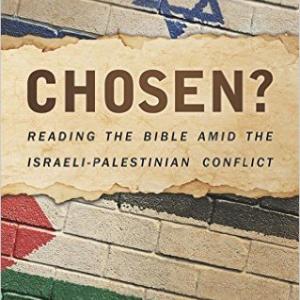
Rosemary Radford Ruether is a visiting professor of feminist theology at Claremont School of Theology. She is the author of 46 books.
Posts By This Author
With Strings Attached
WALTER BRUEGGEMANN is a leading authority of Old Testament interpretation and author of more than two dozen books. In this book he seeks to make a contribution to the application of biblical concepts of God’s chosen people and the promised land in the light of the contemporary Israeli-Palestinian conflict.
This book is slim, focused on the social justice issues and the relevance of key readings of Hebrew scripture to this conflict. It is written to be a manual for group discussions, particularly by Christian groups in churches. Brueggemann focuses on three main themes and their roots in scripture: the meaning of the “God’s chosen people,” the donation of the “holy land” to the “chosen people,” and the relation of Zion and Israel.
The “chosen people” are chosen by God as an arbitrary decision, writes Brueggemann, not based on any superiority of that people to others, but only on God’s love for them. It is an unconditional decision by God to choose this people with whom to have a special relationship. Yet this idea evolves in Israel’s history. There develops the theme that the people of Israel will be held especially accountable by God because of this relationship and punished for their iniquities (Amos 3:2). Isaiah suggests that, in a redemptive future, Egypt and Assyria will be chosen alongside Israel as a “blessing in the midst of the earth” (Isaiah 19:24-25).
Later heirs of the biblical tradition reinterpreted the idea of the chosen people to apply to themselves. Some in the Christian church saw itself as inheriting the status of God’s chosen people. Some in the United States regard this nation as a chosen people, occupying a new “promised land.”
Coloring in Oppression
THIS SHORT VOLUME by Jacqueline Battalora, a professor of criminal justice at St. Xavier University in Chicago, addresses a very important topic in American history and society: The legal, social, and political invention of the category of “white people” as a privileged group, which defines them as the normative Americans over against others, variously defined as “black,” “colored,” “Indians,” and “mulatto.”
When English settlers founded the New England colonies, they referred to themselves as British. As more people from other countries of Western Europe arrived in the area, they tended to group those they saw as similar to themselves as Christians, Germans, etc.—the term “white” was not used—over against “Negroes,” Indians, and rival colonizers such as the Spanish and French.
The term white was first used in colonial law after Bacon’s Rebellion in 1676, during which some African and European indentured servants formed an alliance. Virginia’s colonial leaders responded with a package of laws that created a racial caste of African-descended slaves, distinguished from European servants. These laws decreed that African slaves could not be freed and free Africans could not hold office, serve in the army, or hold European bond laborers. This group was thus disprivileged, in contrast with those of European descent who were defined as “white.”
A Living Example
Brazilian Catholic archbishop Helder Camara brought a "preferential option for the poor" to the center of Christian social thinking.
Cruise Missiles as Political Therapy
More bombings beg the question of who is really in control in this country
Witness to Hope Against a Demonic World
A global society for peace, justice and sustainability requires alternatives
Standing Up to State Theology
The global reach of Christian Zionism.
The State of the Union: Perspectives on the Post-Election Political Terrain
To Preserve and Protect Democracy
Of One Humanity
A feminist theologian discusses issues confronting women, men, and the church



